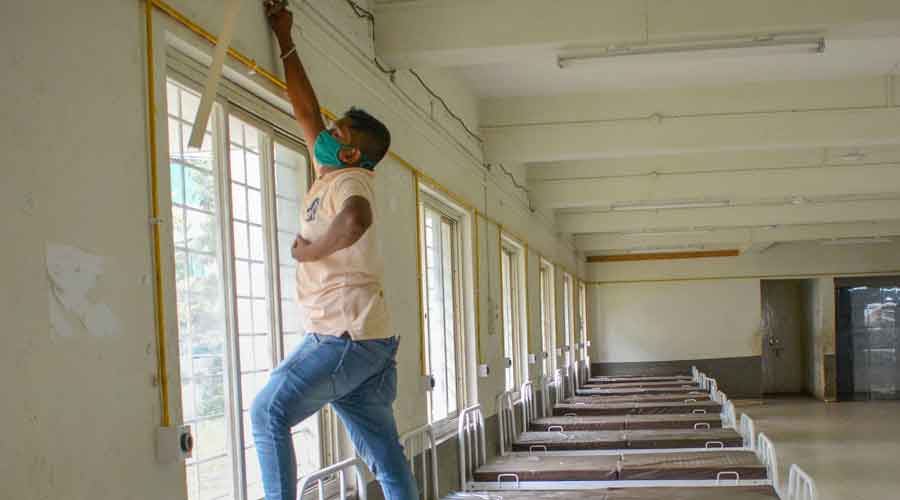The Centre on Wednesday asked 10 states with three-fourths of India’s coronavirus disease cases to launch “grassroot level” public communication initiatives to encourage behaviour change that health experts say would be crucial to control the epidemic.
The Union health ministry has asked Maharashtra, Andhra Pradesh, Tamil Nadu, Karnataka, Uttar Pradesh, Delhi, Telangana, Odisha, Kerala and Chhattisgarh to set up district-level communication teams to promote masks, hand and respiratory hygiene and physical distancing, and coax people to seek early diagnosis.
The ministry said the targeted communication campaign would seek to encourage Covid-19 appropriate behaviour through multiple media vehicles, including electronic, folk, print, outdoor and social media platforms, to convey messages “in an effective manner”. The move comes amid concerns that significant numbers of people across India are not adopting precautionary measures such as masks at a time the epidemic continues to grow. India on Wednesday recorded 83,347 new Covid-19 cases, an upward swing after five days of declining daily counts.
The health ministry and state health authorities have for months stressed the need for members of the public to adopt precautionary measures. But health experts suspect such top-down messages have had limited impact because they were iterated with limited knowledge about target communities.
“Human behaviour change is tricky,” said Preeti Kumar, vice-president for health systems support at the Public Health Foundation of India, New Delhi, who has spent several years guiding HIV prevention efforts.
“It is a challenge that needs to be addressed through well-designed communication strategies that understand the local communities,” she told The Telegraph. “We have to know why do people behave the way they do — is it lack of knowledge, or lack of perception of the threat of the infection, or other factors?”
Kumar and other experts say targeted communication campaigns would likely need to be region-specific.
Experts believe effective risk communication strategies will need to combine top-down messaging from health authorities already in play with horizontal messaging driven by influential groups from within communities that they say is virtually non-existent at present.
“We need urgent, intensive involvement of special groups in local communities to spread safety messages,” said Samiran Panda, chief of the epidemiology division at the Indian Council of Medical Research. “This means young people, residential welfare associations, religious leaders, or members of village councils.”
Both Kumar and Panda believe some of the communication strategies that had been deployed in HIV prevention programmes could hold lessons for efforts to encourage Covid-19 appropriate behaviour.
In HIV prevention efforts, for instance, female sex workers or men who have sex with men played critical roles in encouraging safe sex through peer-led communication in an unprecedented way, Panda said. “They were agents for behaviour change and they weaved success stories thread by thread.”
Similarly, there is a role for peer groups for Covid-19 appropriate behaviour, he said, to curb the spread of the virus.
India’s numbers of daily new Covid-19 cases detected remained below the daily numbers of patients declared recovered for the fifth successive day, lowering the case load of patients under medical supervision to 968,377 on Wednesday compared with 975,861 on Tuesday.
Doctors view any reduction in the number of active cases as encouraging because that would mean less demand for oxygen, intensive care unit beds or ventilators. But infectious disease experts point out that the vast majority of the country’s population remains susceptible to the infection and the epidemic is expected to continue growing.
Public adherence to precautionary measures such as masks and physical distancing will be crucial to curb and slow down the spread of the infection. The slower the spread, experts say, the more manageable is the epidemic.
Ten states account for nearly 74 per cent of the 83,347 new Covid-19 cases documented on Wednesday. Maharashtra made up the largest chunk (18,390 new cases) followed by Andhra Pradesh (7,553), Karnataka (6,974), Uttar Pradesh (5,650), Tamil Nadu (5,337), Odisha (4,189), Kerala (4,125), Delhi (3,816), Bengal (3,182) and Chhattisgarh (3,126).
Prime Minister Narendra Modi on Wednesday interacted with the chief ministers of seven states — Andhra Pradesh, Maharashtra, Karnataka, Delhi, Punjab, Tamil Nadu and Uttar Pradesh — to review the Covid-19 situation. These states make up 62 per cent of active cases and 77 per cent of Covid-19 deaths in the country.
Modi stressed the need to increase focus on testing, treatment, surveillance and “effective messaging”, the health ministry said in a media release.
He said effective messaging was necessary because of the asymptomatic nature of the infection that may lead to doubts about the efficacy of tests. Around 80 per cent of Covid-19 infected persons remain asymptomatic or have only mild symptoms.










